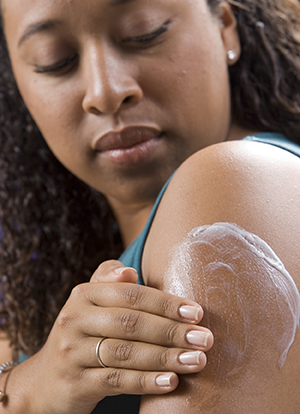Preventing Skin Cancer
Relaxing in the sun may feel good. But it isn’t good for your skin. In fact, the sun’s harmful rays are the major cause of skin cancer. This is a serious disease that can be life-threatening. People of all ages and backgrounds are at risk.
Skin cancer is the most common cancer in the U.S. But there are things you can do to help prevent it or lower your risk.
Your role in prevention
You can act today to help prevent skin cancer. Start by staying away from the sun's UV (ultraviolet) rays. This means reducing your exposure to the sun. And don’t use tanning beds, booths, or lamps. They are no safer than the sun. Taking these steps can help keep you from getting skin cancer. It can also help prevent wrinkles and other aging effects caused by the sun.
Sun damage builds up over time. Make sure your children also follow these safeguards. Now is the time to start taking steps to prevent skin cancer.
When you're outdoors
Protect your skin when you go out during the day. Take safety steps whenever you go out to eat, run errands by car or on foot, or do any outdoor activity. There isn’t just 1 easy way to protect your skin. It’s best to follow all of these steps:
-
Choose protective clothing. Wear tightly woven clothing that covers your skin such as a long-sleeved shirt and long pants. Put on a wide-brimmed hat to protect your face, ears, neck, and scalp. Look for clothing with an ultraviolet protection value (UPV) which offers extra protection.
-
Protect your eyes, too. Wear wrap-around sunglasses to protect your eyes and the skin around them. Make sure your sunglasses have 99 to 100% UVA and UVB (ultraviolet A and B) rays protection.
-
Watch the clock. In the U.S. stay out of the sun between 10 a.m. and 4 p.m. That's when the sun's rays are strongest.
-
Head for the shade or make your own. Use an umbrella when sitting or strolling.
-
Be careful near reflective surfaces. Know that the sun’s rays can reflect off sand, water, pavement, and snow. This can harm your skin. Take extra care when you are near reflective surfaces.
-
Watch out for cloudy skies. Keep in mind that even when the weather is hazy or cloudy, your skin can be exposed to strong UV rays. UV light can pass through clouds even when visible light doesn't.
-
Protect your lips. Use lip balm or lipstick with an SPF (sun protection factor) of 30 or higher.
-
Shield your skin with a broad-spectrum sunscreen of at least 30 SPF. Also use sunscreen on your children’s skin. Keep babies younger than 6 months old out of the sun.
 |
| Use sunscreen of SPF 30 or greater. Apply liberally. |
Tips for using sunscreen
To help prevent skin cancer, choose the right sunscreen and use it correctly. Try these tips:
-
Choose a water-resistant sunscreen with an SPF of at least 30. Also choose a sunscreen labeled "broad spectrum.” This will protect you from both UVA and UVB rays. Water-resistant sunscreens will say on the label if it protects for 40 or 80 minutes while swimming or sweating.
-
Protect your skin when exposed to sun light through glass. UVA rays can pass through glass such as car windows and other types of glass. But UVB rays cannot pass through glass.
-
If one brand irritates your skin, try another, such as one without fragrance.
-
Use at least 1 fluid ounce (or about 30 millimeters) of sunscreen to cover exposed areas. This is enough to fill a palm full. You might need to adjust the amount depending on your body size. Be generous.
-
Put the sunscreen on dry skin about 15 to 30 minutes before going outdoors. This gives it time to soak in.
-
Reapply sunscreen at least every 2 hours. If you’re active, do it more often. If you're swimming or sweating, reapply every hour.
-
Cover any sun-exposed skin, from your face to your feet. Don’t forget your scalp, ears, neck, and lips.
-
Know that while sunscreen helps protect you, it isn’t enough. Sunscreens extend the length of time you can be outdoors before your skin starts to be damaged and get red. But they don't give you total protection. Using sunscreen doesn't mean you can stay out in the sun for an unlimited time. Your skin cells are still being damaged. You should also wear protective clothing. And try to stay out of the sun as much as you can, especially from 10 a.m. to 4 p.m.
-
Shake sunscreen before using it. And keep an eye on expiration dates. Don't use sunscreens that have expired.